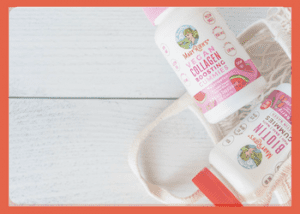Are you looking for a way to boost the health and appearance of your hair? Collagen supplement, the most abundant protein in the human body, has been shown to have a positive impact on hair growth and overall hair health. From improving hair strength and thickness to reducing hair loss and breakage, collagen may be the key to achieving the luscious locks you’ve always dreamed of.
Table of Contents
What is Collagen and How Does it Affect Hair Growth?
Collagen is a naturally occurring protein in the human body that provides structure and support to various tissues and organs. It plays a vital role in skin, bone, and joint health, but did you know it also has a significant impact on hair growth and overall hair health?
In this article, we’ll dive into the science behind collagen and hair growth, exploring the specific benefits of collagen for improving hair strength, thickness, and shine. We’ll also discuss how collagen can help reduce hair loss and breakage and examine the potential long-term benefits of collagen supplementation for hair growth and overall hair health.
Specific Benefits of Collagen for Hair Growth
Studies have shown that collagen can improve the health and appearance of hair in several ways. It can increase hair strength, helping to reduce breakage, and can also improve hair thickness, leading to a fuller, healthier head of hair. Additionally, collagen can improve hair shine, leaving your locks looking lustrous and healthy.
Reducing Hair Loss and Breakage
Hair loss and breakage can be caused by a variety of factors, including genetics, hormonal imbalances, and damage from styling and environmental stressors. Collagen can help by strengthening hair strands, making them less prone to damage and breakage. Additionally, collagen can also help improve the health of the hair follicle and scalp, promoting healthy hair growth and reducing hair loss.
Potential Long-Term Benefits
The benefits of collagen for hair growth and overall hair health don’t stop there. Maintaining optimal collagen levels can have long-term benefits, helping to preserve the health and appearance of your hair for years to come. Additionally, by improving the health of the follicle and scalp, collagen can help prevent future hair loss and breakage, keeping your locks looking their best for a lifetime.
Increasing Collagen Levels for Optimal Results
Collagen supplementation is one of the most effective ways to increase collagen levels in the body. There are a variety of methods for supplementation, including oral supplements, topical creams, and collagen-infused hair products. It’s important to choose a high-quality, reputable brand and to follow the recommended dosage and frequency for the best results.
In conclusion, collagen is a key player in the world of hair growth and overall hair health. By improving strength, thickness, and shine, reducing hair loss and breakage, and preserving the health of the hair follicle and scalp, collagen has the power to transform the look and feel of your hair. Consider incorporating collagen supplementation into your hair care routine for the best possible results.
How Long Does It Take for Collagen to Work for Hair Growth?
Collagen is a powerful tool in the fight against hair loss and breakage, but many people wonder how long it takes for the benefits of collagen to become apparent. While everyone’s hair growth journey is unique, there are some general time frames to keep in mind when it comes to collagen and hair growth.
Initial Results
While individual results may vary, many people report seeing initial improvements in hair strength and thickness within a few weeks of starting a collagen supplement. These improvements can be especially noticeable in areas where hair has been thinning or breaking more easily.
Long-Term Results
For optimal results, it’s important to maintain a consistent collagen supplementation regimen over a longer period of time. Most people begin to see more noticeable changes in hair growth and appearance after three to six months of consistent use. This can include a reduction in hair loss and breakage, as well as a noticeable improvement in hair thickness and overall health.
Factors that Affect Collagen’s Impact on Hair Growth
There are a variety of factors that can impact the length of time it takes for collagen to work for hair growth. This includes things like genetics, overall health and diet, and the presence of underlying medical conditions. It’s important to work with your healthcare provider to determine the best approach for your individual needs and to track your progress over time.
In conclusion, while everyone’s hair growth journey is unique, most people begin to see noticeable improvements in hair strength, thickness, and overall health within a few weeks of starting a collagen supplement. For the best results, it’s important to maintain a consistent regimen over a longer period of time and to work with your healthcare provider to determine the best approach for your individual needs.
Biotin vs Collagen for Hair
Biotin and collagen are two popular supplements often touted for their potential to improve hair growth and overall hair health. Biotin, also known as vitamin H, is a B vitamin that helps the body convert food into energy and is essential for the health of hair, skin, and nails.
 Collagen, on the other hand, is a protein that makes up a significant portion of the skin, bones, and connective tissues and has been shown to have positive effects on hair strength, thickness, and shine.
Collagen, on the other hand, is a protein that makes up a significant portion of the skin, bones, and connective tissues and has been shown to have positive effects on hair strength, thickness, and shine.
While both biotin and collagen can have positive impacts on hair growth, there are some key differences to consider.
Biotin is best known for its ability to strengthen and improve hair growth, while collagen is known for improving the overall health and appearance of hair by reducing hair loss and breakage.
When choosing between biotin and collagen, it’s important to consider your specific hair care needs and goals. If your hair is brittle and prone to breakage, collagen may be the better choice for you. However, if your primary concern is improving growth, biotin may be the better option.
Ultimately, both biotin and collagen can have positive impacts on hair growth and overall hair health, and incorporating both into your hair care routine may provide even greater benefits. However, it’s always important to talk to your doctor before starting any new supplement regimen to ensure it’s safe and effective for you.
Frequently Asked Questions
Does Collagen Thicken Hair?
Collagen is widely known for its power to thicken hair, but it also offers a plethora of additional benefits. Not only may it reduce hair loss and boost healthy locks, but collagen’s impact on skin elasticity also extends to your scalp as well. Additionally, this protein aid can improve both nail and skin health too.
How Much Collagen Should I Take Daily for Hair Growth?
Consume 5 grams of collagen daily and watch as your nails fortify and your hair thickens, displaying a more lush appearance. Studies validate the efficacy of this action!
What is Collagen Good For?
Collagen is a vital protein that helps keep skin looking youthful and strong while helping to maintain the strength of bones, muscles, tendons, and ligaments.
In addition to providing support for healthy tissue growth and structure, collagen assists in repairing injuries faster as well as improving joint flexibility. Collagen truly works miracles in keeping our bodies functioning properly.
Do Collagen Supplements Help Skin?
Collagen supplements have garnered attention for their potential to benefit skin health, but the scientific evidence supporting their effectiveness is mixed and nuanced. Collagen is a protein that plays a crucial role in the structure and elasticity of the skin, making it an appealing candidate for improving skin appearance. However, the impact of collagen supplementation on skin largely depends on several factors:
- Collagen Absorption: Collagen supplements primarily consist of collagen peptides, which are broken down into smaller fragments for better absorption. The extent to which these peptides are effectively absorbed and distributed to the skin is a matter of ongoing research.
- Skin Health: While some studies suggest that collagen supplementation may lead to improved skin hydration, elasticity, and overall appearance, results are inconsistent. The effects can vary depending on the individual’s age, baseline collagen levels, and the specific collagen formulation used.
- Collagen Types: Collagen supplements often include different types of collagen, such as type I, II, and III. Type I collagen is the most abundant in the skin. Selecting the right type of collagen for skin benefits is a consideration.
- Lifestyle and Diet: Factors like diet, exposure to UV radiation, and smoking can impact collagen production and skin health. Supplementing with collagen alone may not provide comprehensive skin benefits without addressing these lifestyle factors.
- Duration and Dosage: The optimal duration and dosage of collagen supplementation for skin benefits are still under investigation. Long-term studies assessing the sustained effects of collagen supplementation are limited.
In summary, while collagen supplements hold promise for improving skin health, their efficacy is not universally established. The outcomes can vary among individuals, and the results are influenced by factors like the type of collagen used, individual characteristics, and lifestyle choices. Consultation with a healthcare professional or dermatologist can help determine whether collagen supplementation is appropriate for achieving specific skin-related goals. Additionally, maintaining a balanced diet and proper skincare practices are essential components of overall skin health.
Conclusion
Collagen plays a crucial role in hair growth and overall hair health by providing the necessary building blocks for hair structure and promoting hair strength.
In order to improve hair growth and overall hair health, individuals can consider incorporating collagen-rich foods into their diet or using topical hair products that contain collagen. Additionally, leading a healthy lifestyle with a balanced diet, regular exercise, and reducing stress levels can also help promote hair growth and overall health.
